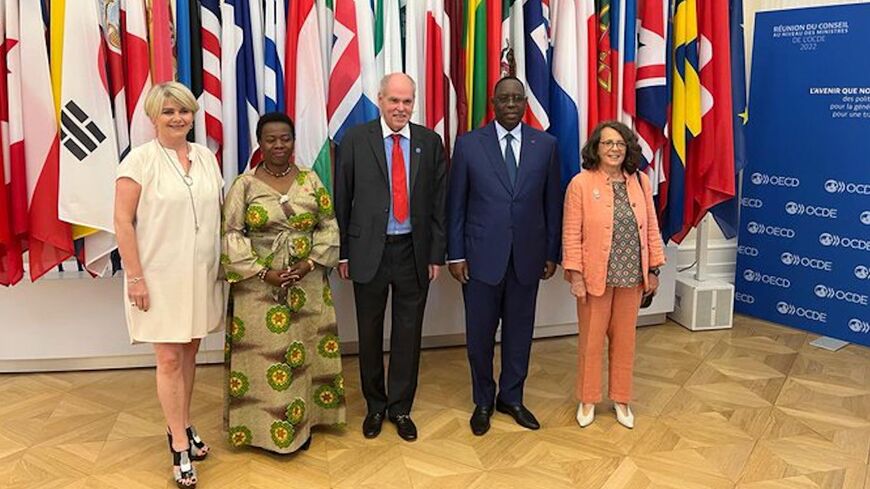PARIS — “Israel is part of the family of nations, so it has a role to play in Africa. In partnership. I must say that in several African countries, Israel is working in specific domains such as agriculture, security, defense and other sectors. Now, Israel should take part in this general effort for Africa, because it (Israel) is an important country,” African Union Chief and President of Senegal Macky Sall told Al-Monitor.
In France for the annual Africa Forum organized by the OECD, Sall expressed his hopes for continued Israel engagement in the continent. Talking to Al-Monitor, Sall explained that countries of the world must understand that Africa, too, is important. “We cannot have the Ukrainian war becoming a new burden for the African continent. Unfortunately, the war has created this situation (of a global crisis), and there were also the sanctions. So it's important to remove the constraints related to sanctions that impede on food and fertilizers,” he said.
The statement by Sall on Israel’s role in Africa is significant in view of Sall’s capacity as chief of the African Union and also in view of his capacity as president of Senegal.
As a reminder, Israel achieved last July the status of observer to the organization. After Algeria, South Africa and a few other African countries strongly rejected the move, the African Union decided last February to reexamine objections at its next official meeting in the beginning of 2023. It was a way to preserve Israel’s status of observer while delaying confrontations on the issue for at least a year. A committee including representatives of Algeria, South Africa, Senegal, Cameroon, the Democratic Republic of Congo, Rwanda and Nigeria was tasked with preparing recommendations for the next summit.
The composition of the committee is supposedly balanced. Algeria has no diplomatic relations with Israel. South Africa has diplomatic ties but champions traditionally anti-Israeli policies. Cameroon has strong trade and cooperation ties with Israel, and so has the Democratic Republic of Congo. Rwanda is one of Israel’s most significant allies in Africa in recent years. Nigeria maintains diplomatic ties with Israel, including on security, but its large Muslim population means that Abuja traditionally votes in favor of the Palestinians at the UN and other international organizations.
Senegal, in that respect, operates like Nigeria. Jerusalem and Dakar maintain cordial diplomatic relations, but votes at the UN are a sensitive issue. Still, Israeli-Senegalese relations are definitively growing and expanding in the past few years, especially on smart agriculture and water management.
Israeli diplomats told Al-Monitor they do not believe that the African Union will revoke the observer status, especially since the Palestinians enjoy a similar status for several years now. The more Israel will engage with African countries in trade, training and cooperation projects, the less the African Union is likely to cancel its decision. The announcement by Liberia June 8 on opening a trade office in Jerusalem clearly reinforces the pro-Israeli camp within the African Union.
The Abraham Accords was certainly a major generator for the African Union to accept Israel as an observer. But there are also other geopolitical developments that impact Israel’s status in the African continent. One of them is the Renaissance Dam Ethiopia has built on the Nile. In the past few years, allegations surfaced against Israel for allegedly supporting its long-time ally Ethiopia in this endeavor against Egypt and Sudan.
Jerusalem was always extremely careful to distance itself from this dispute, and more so in the past two years after normalizing diplomatic ties with Khartoum and warming up relations with Cairo. In parallel, Israeli diplomats confirmed to Al-Monitor that Jerusalem keeps a low profile in everything that concerns the civil war in Ethiopia.
That being said, the Ethiopian civil war increased pressure on Jerusalem to allow the immigration of Ethiopian relatives of Israeli nationals. In November 2021, the government approved bringing 3,000 new immigrants from Ethiopia to Israel. Several groups arrived so far, with 180 Ethiopians arriving on June 1. The Jewish Agency said the total of the 3,000 should arrive to Israel by November 2022. This issue plays an important role in Jerusalem’s ties with Addis Ababa.
On a more general note, we have reported here already on the increasing role Israeli companies are playing in Africa and elsewhere, on the backdrop of the global wheat crisis, on smart agriculture and the production of fertilizers. Facing the nutrition and energy crisis generated by the Ukraine war dominated today’s OECD meeting. Israeli expertise in water management, desertification, agriculture in extreme weather conditions, high-tech dairy farms, etc., has long been its strong suit in bilateral trade with African countries, but the current wheat crisis turned these capacities into especially hot commodities.








